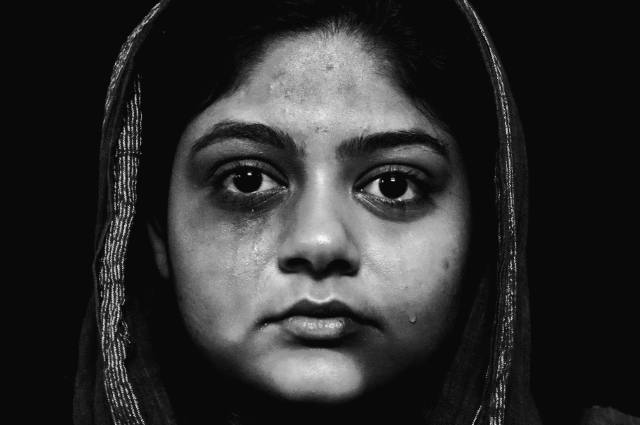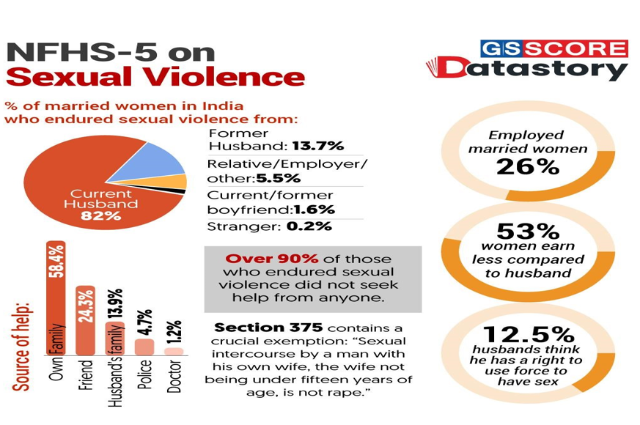
Photo by Sneha Sivarajan on Unsplash
Recognizing Marital Rape
Many people view marriage as a holy union a connection based on love, trust, and respect for one another. But beneath the surface of married joy, there lurks a serious problem that has long been hidden and stigmatized: marital rape. The occurrence of sexual violence within the marriage institution is extremely concerning as it goes against established legal frameworks, cultural values, and societal norms.
Sexual actions committed against the consent of the other spouse by one spouse are referred to as marital rape. Many civilizations have historically disregarded or overlooked this infringement, spreading false beliefs that compromise each person's autonomy and agency inside a marriage. By examining the frequency, repercussions, and current initiatives to address this frequently disregarded problem, this article seeks to raise awareness of the seriousness of marital rape.
Although there has been significant focus on study on marital rape, studies and literature specifically addressing homosexual marital rape are still notably lacking. Recent legalization of homosexual marriage in certain nations has opened the door to more research in this important field. Before this, research on the frequency and circumstances of homosexual marital rape was hampered by the absence of legal recognition of gay marriage.
It's critical to remember other instances of gendered violence, such as date rape, elder abuse, child abuse, and same-sex assault, while we examine the nuances of marital rape. We may strive toward comprehensive solutions for addressing and preventing all forms of intimate partner violence by expanding our understanding.
Marital Rape's Psychological Repercussions
The psychological health of victims of marital rape suffers greatly as a result of the act itself, which sets off a chain reaction of negative emotional and mental effects that last for a long time. A major theme is the severe breakdown of trust in the marriage, leaving survivors feeling deeply betrayed as the integrity of the marital link is undermined. Emotional trauma takes on a life of its own and frequently shows up as symptoms of post-traumatic stress disorder (PTSD), ranging from fear and anxiety to guilt and shame. Survivors must then traverse a maze of worthlessness and inadequacy as a result of the trauma's profound effects on identity and self-esteem.
The violation of consent in marital rape can also give rise to sexual dysfunction and aversion, further complicating the journey towards intimacy. Beyond immediate consequences, the long-term mental health effects are stark, with survivors contending with depression, anxiety disorders, and even thoughts of suicide. Yet, societal stigmas act as formidable barriers, preventing survivors from disclosing their experiences and accessing the crucial support needed for healing. Addressing these psychological repercussions demands a comprehensive societal shift, dismantling taboos, fostering empathy, and creating an environment where survivors can seek help without fear of judgment. Recognizing the lasting impact is an essential step toward constructing a compassionate and supportive framework for survivors on their path to recovery.
The Demand of Justice
Legal action must be taken immediately in response to marital rape since it is a flagrant violation of trust and autonomy inside the purportedly sacred institution of marriage. Social taboos that enforce quiet on this deeply ingrained problem, which is present in many cultures, continue to cast it in the shadows. It is essential for legal action to be taken in light of the
psychological cost and the fact that it is a flagrant violation of fundamental human rights. The necessity of comprehensive, survivor-centric changes is highlighted by an understanding of the historical background and global differences in legislative responses. Legal redress in this case should include the removal of obstacles to justice, the establishment of precise definitions, and expedited reporting procedures in addition to punitive penalties.
But issues like survivor reluctance and cultural resistance demand an integrated strategy that includes public awareness and education. The demand for legal recourse transcends national boundaries, highlighting the significance of global cooperation and the implementation of best practices to establish a strong, internationally coordinated response. The pursuit of legal recourse for marital rape is, at its core, a social commitment to justice, a declaration that no one should be subjected to such abuses without consequence, and a spark for a cultural revolution that places a premium on the rights, dignity, and well-being of all individuals, regardless of their marital status.
Disparities in Legal Frameworks
There are notable differences in the legal systems around the world concerning marital rape, which are a reflection of various historical, social, and cultural backgrounds. These differences add to a complicated situation where unclear laws, imprecise terminology, and uneven application frequently prevent survivors from accessing justice. Insufficient guidelines make it more difficult for survivors to pursue legal recourse.
It is clear from analyzing these differences that definitions of marital rape vary greatly, ranging from overt prosecution to a complete lack of legal recognition. Certain legal regimes include extensive definitions that prioritize the needs of survivors, clearly outlawing non-consensual activities in marriages. On the other hand, some legal texts are ambiguous, which might lead to misunderstandings and possible gaps that could hinder successful legal action.
Furthermore, there are wide variations in how laws prohibiting marital rape are enforced. Survivors are discouraged from reporting occurrences because law enforcement organizations in certain places may not have the necessary resources or training to handle cases delicately. Furthermore, the propensity of judicial authorities to step in may be influenced by society attitudes and prevalent cultural norms, which further exacerbates the difficulties experienced by survivors seeking justice.
Another layer of difficulty is the problem of marital immunity, which refers to the legal doctrine that has historically protected spouses from prosecution for rape committed within a marriage. Spousal immunity laws have been changed or abolished in certain jurisdictions, while they remain in place in others, creating a structural impediment to justice
In addition to having an effect on survivors' capacity to pursue justice, these legal inequalities support negative gender norms in society. Taking note of this, advocates and legal experts stress that in order to create a single norm, international cooperation and the exchange of best practices are essential. A thorough resolution of these legal discrepancies will need the development of international conventions or accords that provide precise definitions, do away with spousal immunity, and guarantee uniform enforcement.
Challenges Faced by Judicial System
When it comes to dealing with marital rape, the Indian judiciary has a variety of difficult challenges that are a reflection of sociological, legal, and structural issues. The most significant of these difficulties is the legal ambiguity surrounding marital rape, since survivors cannot obtain appropriate reparation in the absence of particular law. The legal system is influenced by societal opinions and deeply ingrained gender stereotypes, which may lead to contemptuous attitudes toward survivors and affect judgments. Significant underreporting occurs as a result of the widespread stigma associated with talking about private issues in marriages, which is exacerbated by survivors' lack of trust in the justice system and anxieties of being judged.
Survivors encounter evidential obstacles due to the burden of proving non-consent, and the antiquated notion of spousal immunity impedes legal advancement. Delays in the judicial system worsen the emotional toll on survivors and may discourage them from seeking legal recourse. The inadequate training and sensitization of judicial staff, together with the dearth of outreach and support programs, all lead to a system that frequently falls short in addressing the intricacies of marital rape. To meet these challenges, the Indian judiciary must undergo extensive reforms, such as legal modifications, awareness campaigns, and measures to eliminate social stigmas. Only then will the judiciary become a more adaptable and survivor-focused organization that can handle cases of marital rape.
DATA REPORT
Although the subject is still being explored extensively, the majority of married women in the nation who have experienced sexual abuse have had their husbands to blame, according to the most recent government data.
"Among married women aged 18-49 who have ever experienced sexual violence, 83% report their current husband and 13% report a former husband as perpetrator," states the National Family Health Survey 5 (2019–21).

In a nationwide survey conducted by the Ministry of Health and Family Welfare, six percent of women between the ages of 18 and 49 reported having been sexually abused at some point in their lives.
Eighty-two percent of the 4,169 married women who reported having suffered sexual violence claimed that their husbands were the perpetrators. A significant proportion of them, accounting for 84%, reported that their spouses "physically forced her to have sexual intercourse with him even when she did not want to." The definition of rape in the IPC is comparable to this.
Conclusion
To sum up, the issues raised by marital rape in the Indian judiciary highlight the urgent need for extensive reform in order to provide survivors with justice. Legal uncertainty and a lack of explicit regulation contribute to the continued underreporting of marital rape. Gender stereotypes and societal views exacerbate the problem by fostering a dismissive mindset and impeding the legalization of marital rape as a crime. The deep-rooted stigma associated with private affairs in marriage, along with evidentiary difficulties and the continuation of spousal privilege, poses significant challenges for survivors pursuing legal recourse. The pursuit of justice is further hampered by judicial procedure delays, a lack of awareness-raising, and inadequate support services.
In order to overcome these obstacles, legislative reforms that clearly outlaw marital rape, do away with antiquated legal precepts, and expedite court procedures must be implemented. Increased awareness campaigns and judicial staff sensitization programs can help create a legal system that is more compassionate and focused on the needs of survivors. The Indian judiciary must place a high priority on eliminating prejudices and social stigmas that obstruct the administration of justice in order to create a climate in which survivors feel empowered to pursue legal action and are supported in doing so. The demand for reform must be steadfast and unyielding, based on the core values of justice, equality, and the defense of human rights, in order to imagine a time when the legal system actively combats marital rape.
. . .
REFERENCES:
